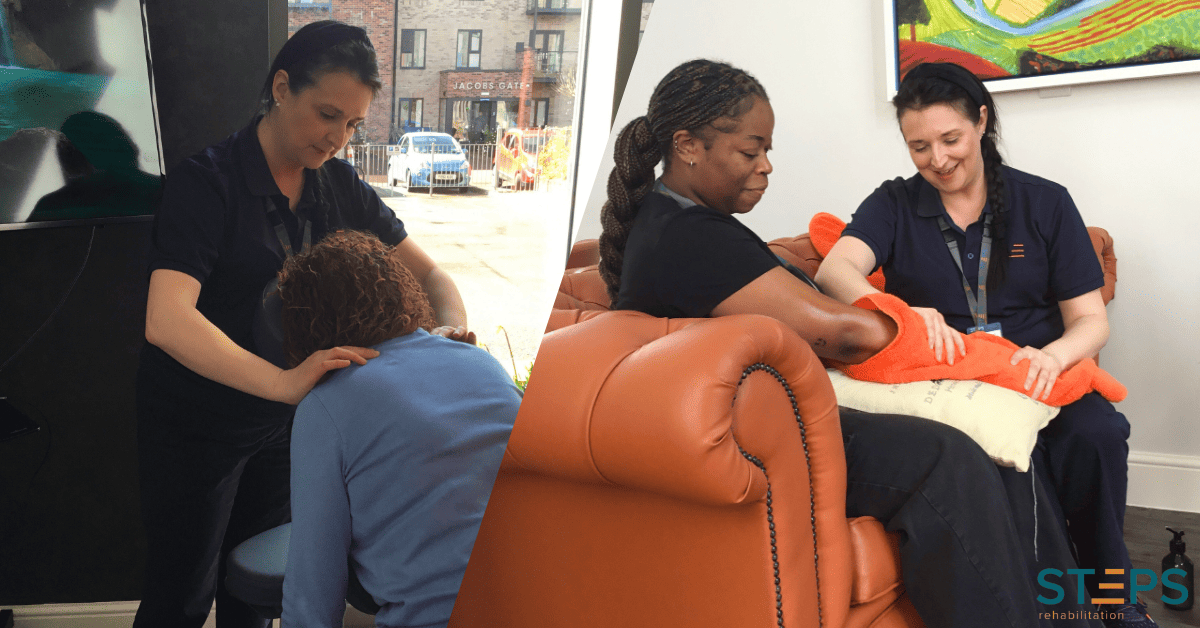Massage Therapist, Alison Haywood explains the benefits of massage therapy for clients at STEPS Rehabilitation.

Massage Therapy is widely used at STEPS, it’s looked upon by our clients as a pleasant and enjoyable part of their rehabilitation programme. Massage therapy can be used in all kinds of ways, from deep invigorating muscle treatments to low stimuli sessions that can help calm and relax an individual. The latter of these being incredibly important for clients who have suffered a traumatic brain injury (TBI). We have found that much of the hyper-animated behaviour these clients may exhibit, can be calmed and often stopped all together with the use of low stimuli massage. We have often witnessed a client, go from being very agitated, to a fully relaxed state which is very rewarding as a therapist and obviously very beneficial to the individual client. Once in this relaxed state, we can begin quiet and calm interactions that aid recovery.
Many of my sessions are for clients who have suffered a spinal cord injury (SCI). Massage therapy helps to stimulate the muscles below the site of their injury. Many of our clients with a spinal cord injury experience spasticity (abnormal increase in muscle tone or stiffness of muscle). Massage therapy can relax these areas, it is very important as this allows the client to move more freely in other therapy sessions and has a positive effect on their rehabilitation progress.
We find that at STEPS we can achieve excellent results with our clients when we combine traditional and complementary therapies. Our clients not only benefit physically from a massage session, they also report feeling mentally stronger after treatment. This is a result of the “hands on touch” of massage that triggers the secretion of a natural anti-depressant called serotonin, this reaction can be felt immediately after a therapy session. It creates a feeling of calm and happiness even in the most severely injured of clients.
Benefits of Massage Therapy
- Improved circulation.
- Decreased muscle stiffness.
- Decreased joint inflammation.
- Better quality of sleep.
- Quicker recovery times after injury.
- Improved flexibility.
- Less pain and soreness.
- Strengthened immune response.
- Boosts mental health and Well-being, feeling happier and stronger.
- Reduces anxiety.
- Emotional healing.
- Improves general quality of life during times of exceptional circumstances.
Client A
This client had suffered a TBI due to a road traffic accident that resulted in the client having very serious injuries and presenting in a minimally conscious state of PDOC (Prolonged disorder of consciousness). No voluntary movement was noted on arrival at STEPS. Multiple sessions of massage were offered in the client's best interest.
An increase in the client’s ability to move their right upper and lower limbs during the treatments was noticeable after only a short period of time. Aromatherapy and the use of pure essential oils was also introduced into the sessions to attempt olfactory stimuli and some new signals of response to different smells were noted during the sessions. The positive changes are recorded, and regular meetings are in place to discuss progress. This is a highly specialised area of our work, and no client will present the same.
These complementary therapy sessions fully support the more traditional rehabilitation therapy sessions that the clients experience during their time at STEPS.
